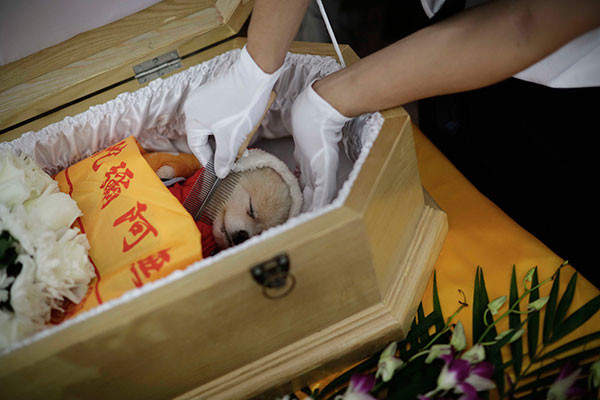Funeral services for animals seek official recognition
By Wang Xin and Cang Wei (China Daily) Updated: 2015-09-17 07:49
 |
|
The dog at rest in a tailor-made coffin. [Photo provided to China Daily] |
Legal lacuna
Su Decheng, director of the Law Enforcement Monitoring Unit at the Jiangning District land and resources bureau, said Chinese law doesn't provide for the establishment of pet cemeteries.
"Just like cemeteries for humans, those for pets must be approved by the government before the operators can acquire the land. Pet cemeteries won't be approved, though," he said.
According to Nanjing Ai-Bi Pet Co, one of China's largest pet hospital chains, very few people choose to cremate their pets and keep the ashes. About 30 percent of owners choose to bury their pets in deep holes, while another 30 percent ask hospitals to incinerate the bodies along with medical waste. The remainder simply dumps the bodies when and where they can.
Du Wanxin, a researcher with the Animal Disease Control and Prevention Center in Luoyang, Henan province, said burying or dumping bodies may spread viral diseases such as distemper, which can remain active even after several years underground.
"Some viruses can live in the bones after the flesh decomposes," Du said. "The animals must be buried at least two meters deep, and the holes should be filled with lime. They must also be disinfected with lime if an accelerant has been used to cremate the bodies. Burial sites must be located far from water sources, communities and traffic arteries."
In 2013, there were 120 million registered pets in China, a ninefold rise from 2003, and pet industry sales exceeded 90 billion yuan, according to China Central Television.
The Nanjing Agriculture Commission said there are 51 pet hospitals in the city's downtown and three new facilities open every year. About 32,000 dogs have been registered, but large numbers of dogs and other pets remain unlisted, and about 1,600 dogs die every year.
- Australian father takes on drug dealers
- Tough battle forecast for gender imbalance
- China's top court stresses harsh penalties after Tianjin blasts
- Chinese premier congratulates new Australian PM on swearing-in
- President Xi to visit US and attend UN summit in late September
- Nation takes measures to ease green card access
- Chinese city scraps franchise fees to break taxi monopoly
- Beijing to charge emitters of PM2.5-forming pollutants
- New system catching computer abusers at work
- Xi urges to open economy wider to world







